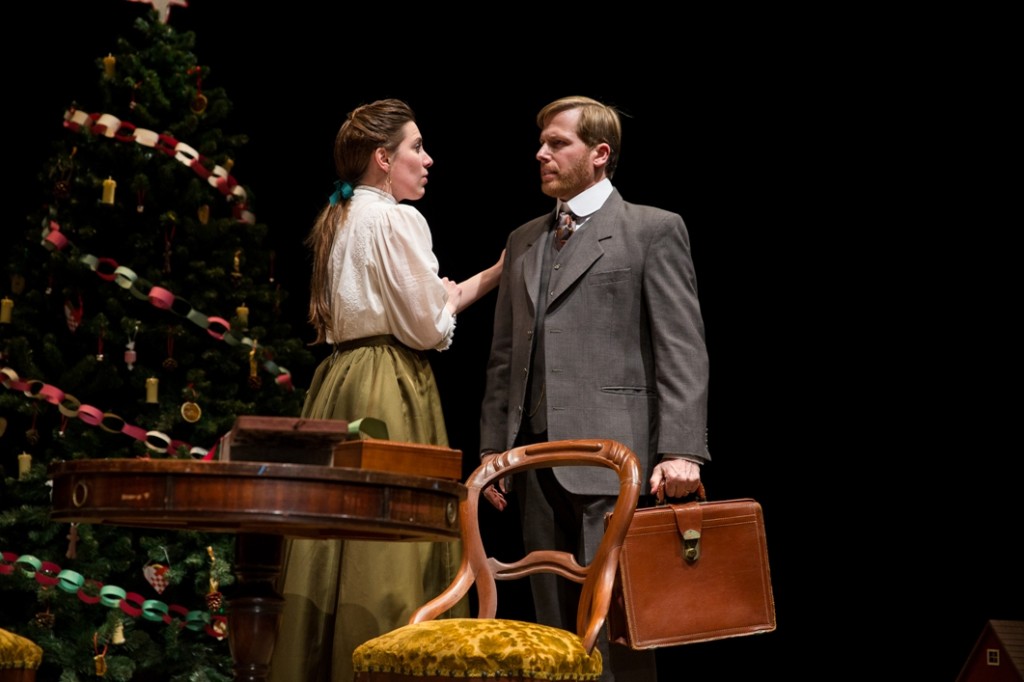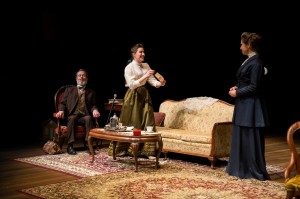“A woman cannot be herself in modern society . . . an exclusively male society, with laws made by men . . . who assess feminine conduct from a masculine standpoint.” —Henrik Ibsen

Ingmar Bergman’s NORA, the Swedish filmmaker’s 1981 stage adaptation of Henrik Ibsen’s A Doll’s House (translated by Frederick J. Marker and Lise-Lone Marker), is pared-down, focused, and intense. By reducing Ibsen’s original lengthy script by nearly half and eliminating all but the five main characters (the children, nanny, and maid have been removed–just as they will be from Nora’s new life), Bergman endows the 19th-century feminist milestone with a post-modern clarity and import, while still retaining the original era in which it is set. Delaware Theatre Company’s powerful period-style production captures all of the heightened passion of then, and its dramatic impact for now, in a taut, fervent, and sardonic 90 minutes without intermission.
The relevance of the play concerns the imbalance in the marriage of Nora and the paternalistic Torvald Helmer, and between women and men in society at large. She is a suppressed and pampered child-wife, who comes to recognize, in a sudden epiphany spurred by her husband’s selfish anger over a secret revealed, that she wants to be more than a passive doll in his house; her only option for a full life as “a human being” is to leave her family and to live on her own. It was a momentous decision for a woman to make in 1879, when Ibsen’s play premiered, engendering criticism and controversy over the strictures of marriage and the fulmination of women’s rights–a theme of gender-based injustice that still reverberates in our time and throughout world cultures.
Kim Carson shines as Nora, masterfully evincing her character’s emotional maturation and dramatic transformation with depth and nuance. She is at first giggly, gay, flirtatious, and obedient, though taking pleasure in such small acts of defiance as eating macaroons and swearing–disapproved by her husband and society. She then becomes increasingly pained and determined, as she acknowledges her empty life and loveless marriage to “a stranger,” and realizes what she must sacrifice for a chance at personal fulfillment, making her exit with the iconic “door slam heard around the world.” Director Michael Mastro’s meaningful blocking visually reinforces the inequality between the spouses and their reversal of circumstances. In the early scenes, Nora is seated as Torvald stands over her, scolding and condescending to his “little songbird.” But in the end, she stands tall and he is in the inferior position, in their bed and on the floor, begging her not to leave him. He is now hysterical, while she is clear-headed and decisive, for the first time in her adult life.

Mastro’s supporting cast brings all the right emotions to the characters and their interpersonal relationships. David Arrow is controlling, patronizing, and egomaniacal as Torvald, exhibiting more concern for his finances, status, and reputation than he does for his wife—his full partner in sex, but in little else. He convincingly flies into the rage that reveals his true colors and causes Nora to abandon him, reducing him to the vulnerable child that she previously was. Susan Riley Stevens as Nora’s old friend Mrs. Linde captures the bitterness of a widow left alone, with no money, no children, and, consequently, no grief for the husband she married for economic security rather than love, underlining Ibsen’s leitmotiv of the limitations imposed on women by a male-dominated society. Rounding out the excellent cast are Chris Thorn as Krogstad, whose desperate situation leads him to blackmail Nora and to expose her secret to the outraged Torvald, for which he later repents, and Kevin Bergen as Dr. Rank, Torvald’s depressed and dying friend who nurses a secret love for Nora and at last reveals that he, unlike her husband, would do anything for her.
DTC’s artistic team contributes to both the mood and symbolism of the story, as blackness surrounds the traditional 19th-century appointments, ornamented Christmas tree, and collection of doll houses in the Helmers’ home (scenic design by Alexis Distler). Spotlights on Nora illuminate her moments of growing enlightenment, and the surrounding darkness gives way, in the final scene, to the blue and orange sky of a beautiful sunrise (lighting by Christopher J. Bailey), seen beyond the door Nora closes on her life as a wife and mother. Well-fitted historicizing costumes (Esther Arroyo) add further definition to the characters, their economic circumstances, and social rank, and to Nora’s growth from a frilly trophy wife to a serious independent woman. [200 Water Street, Wilmington, DE] February 4-22, 2015; www.delawaretheatre.org.
